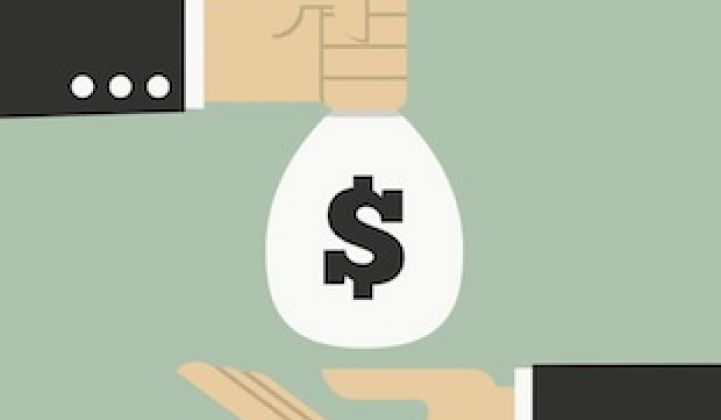The number of solar loans for residential rooftop systems in the U.S. is on the rise for a number of reasons.
As hardware and installation costs go down, so too does the need to defer high upfront payments. As a result, the homeowner keeps more money in her pocket than if she rented out her roof to a leasing company.
Third-party-owned solar systems have succeeded because for a time, they were the most affordable option for U.S. homeowners. But solar is getting cheaper and new loan products are hitting the market, thus slowly eroding the dominance of solar leases and power purchase agreements. In a report last month, GTM Research projected that third-party-owned solar would peak in 2014 and see a slight decline over the next few years.
So far, a major concern has kept many consumers from actually taking out a loan and buying a PV system: the worry that system components might not last 25 years and high maintenance costs could significantly diminish their return on investment.
This is where solar crowdfunding pioneer Mosaic and microinverter manufacturer Enphase Energy enter the picture. On Tuesday morning, the two companies announced a loan offer they're calling “worry-free solar ownership."
Mosaic will allow homeowners to take out a twenty-year solar loan with no down payment and a 4.99 percent interest rate. The loan is bundled with residential operations and maintenance services (O&M) provided by Enphase. Mosaic expects the new package to fulfill at least $100 million in loan volume over the next eighteen months.
“Mosaic homeowners can now have complete peace of mind when getting a Mosaic Home Solar Loan,” said Billy Parish, founder and chairman of Mosaic.
Marty Rogers, vice president of global consumer service and support at Enphase, thinks the unique package will make it easier for installers to close loan-based sales.
“Enphase offers a comprehensive solar energy system with proactive O&M services that will transform the installer’s ability to capitalize on the growing segment of solar loans by having more time and resources to contribute to the sales process," he said.
This bet on a loan-warranty bundle is partly based on an online survey of 1,031 California homeowners that was conducted by Mosaic in April. According to the survey, around 60 percent of respondents would prefer to own a residential rooftop system rather than lease it, assuming that savings and performance are similar.
And, more importantly, among the 26 percent who still favor leases, more than half would choose a loan instead if a warranty was included. Mosaic is also promising to mitigate any potential issues for the homeowner trying to sell her house. The loan can be paid off at any time with no penalty or can be transferred to the new homeowner.
But a warranty is only as good as its fine print. For many solar installations with poorly performing modules, the burden of proof lies with the owner. Many manufacturers insist that the owner pays for transportation and testing first before they are willing to discuss potential reimbursement.
Mosaic's Billy Parish said that can't happen with the Mosaic/Enphase bundle: “Warranty providers and/or Enphase will pay. This depends on the specific warranty specifications for a given module or inverter, but Enphase will cover what the warranty doesn't.”
The only thing the warranty does not cover is an installer mistake made when installing the system.
Asked why Mosaic is teaming up with Enphase and not with any of the other inverter companies in the market, Parish replied: “Enphase has significant market share in the U.S. and is ahead of the curve with their inverter technology. They can do remote diagnosis to proactively address the need for system repairs and enable homeowners to track their system performance easily online or via mobile device. Enphase also has an incredible O&M servicing option that guarantees that the equipment will work 95 percent of the time if installed correctly.”
Parish also hopes that higher-quality loans will help the securitization process. In Mosaic's experience, lenders and investors have historically viewed solar loans as riskier than leases because there is no assurance that the system will continue to produce energy after installation. The new alliance between Mosaic and Enphase is therefore a significant step forward for the residential solar loan asset class.



